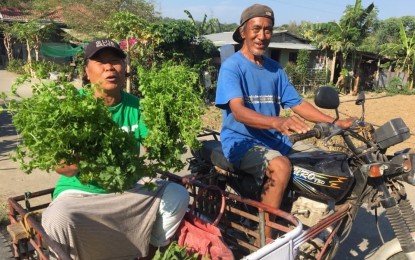
(File photo)
MANILA -- Senator Robinhood Padilla on Thursday urged concerned government agencies to help Filipino farmers and fishermen to become businessmen in order to alleviate them from poverty.
During a hearing conducted by the Senate Committee on Trade, Commerce and Entrepreneurship, Padilla asked representatives of agencies if there are programs to organize farmers and fishers into cooperatives, and to help them run their own businesses.
"Hindi po ba sila pwedeng i-train na ang kanilang raw materials.. lagi na lang kasing raw kukunin ng trader, maiiwan ang magsasaka o mangingisda, kikita ang trader. Di po ba tayo makagawa ng paraan na tulad sa ibang bansa, ang magsasaka at mangingisda nila ang may matatawag na magandang buhay (Can we not train them how to trade their raw materials.. traders always get their products raw, the farmer or fisherman get left behind, and the trader profit. Can we not find a way to be like other countries where farmers and fishers have a good life)?" he said.
"Kasi nakakaawa ang magsasaka natin, ang anak nila ayaw nilang gawing magsasaka (Our farmers are so helpless that they do not want their children to follow in their footsteps)," Padilla said.
When the Cooperative Development Authority's representative said the agency is coordinating with other government agencies such as the Department of Agriculture (DA) and its Bureau of Fisheries and Aquatic Resources (BFAR) on the matter, Padilla urged them to “prioritize helping farmers and fishers to have their own businesses.”
The Senate panel, which was chaired by Senator Sonny Angara, was tackling several measures pushing for the "Poverty Reduction Through Social Entrepreneurship (PRESENT) Act."
Meanwhile, Senate President Juan Miguel Zubiri has assured the agriculture sector that the proposed Regional Comprehensive Economic Partnership (RCEP) Agreement will not pose a threat to them.
In a statement, he stressed that highly sensitive agricultural products such as rice, swine meat, poultry meat, potatoes, onions, garlic, cabbage, sugar and carrots are excluded from tariff liberalization under RCEP.
"In RCEP, the Philippines merely gave additional preferential arrangements to 33 agricultural tariff lines specifically for Australia, New Zealand, China, and Korea, compared to the existing ASEAN +1 FTAs," he explained.
He added that these 33 tariff lines are equivalent to only fifteen products, most of which pose no threat to our local products.
The fifteen products are fish fillet; frozen mackerel; celery; sausages; olives; spinach; olive oil; live swine; live chicken; black pepper; palm nuts and kernels; preserved sweet corn, chilis and other capers; preserved onions; corn starch; and feeds for primates.
Zubiri also proposed a set of guidelines for the implementation of the agreement, identifying protective measures and capacity-building programs for the agricultural sector.
The Senate President likewise assured that a Senate Special Oversight Committee on the RCEP Agreement will be created to monitor the policies and programs of concerned government departments, agencies, and if necessary, come up with legislative proposals to pursue structural reforms and address implementation gaps. (PNA)
